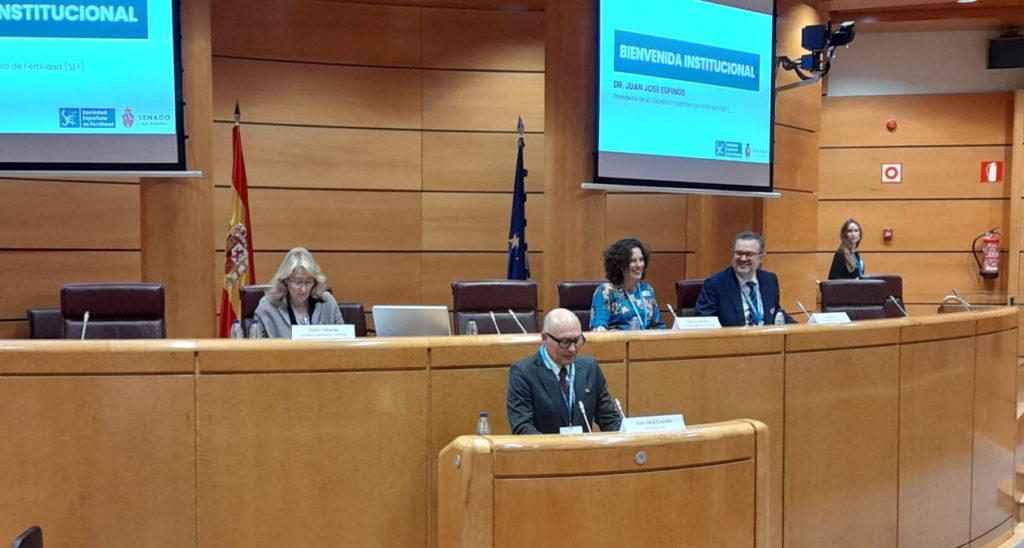
The Sociedad Española de Fertilidad (SEF) (Spanish Fertility Society) has presented before the Senate a document agreed with seven other medical associations and representative agents in the field of fertility and reproductive health. Its aim is to open a social debate and promote political measures that contribute to tackling the alarming drop in the birth rate in Spain.
The document, called “Consensus on Birth Rate and Reproductive Health in Spain”, analyses the factors that have led to the current situation and outlines a road map to try to reverse this trend. It also defines the challenges to be faced at a social level and offers a series of recommendations aimed at both the population and political decision-makers.
Among the professionals who attended the presentation of this roadmap were experts in assisted reproduction from our centre, such as Dr Elisabet Clua, biologist in charge of the Oocyte and Embryo Donation Program at Dexeus Mujer, who attended in her capacity as secretary of the Gamete and Embryo Donation interest group of the SEF.
In addition to the SEF, which has promoted the initiative and has acted as coordinator, the societies which have participated in the drafting of the document are: the Sociedad Española de Ginecología y Obstetricia (SEGO) (Spanish Society of Gynecology and Obstetrics), the Sociedad Española de Medicina de Familia y Comunitaria (SemFYC) (Spanish Society of Family and Community Medicine), the patient associations Red Nacional de Infértiles (RNI) and Asproín, as well as the Spanish federations of Sociology (FES), Nutrition (Fesnad) and Midwifery (FAME).
In less than 50 years, the number of children per woman in Spain has halved from 2.7 in 1975 to 1.1 in 2021, while 2.2 is needed for population growth to occur. This reality places us second to last in Europe, only behind Malta. Currently, the average age at which Spanish women have their first child in Spain is 32.6 years, and births among women aged 40 and over have increased by 38 % in 10 years.
According to specialists, the low birth rates recorded in recent years are related to socioeconomic and structural aspects, such as youth unemployment or difficulties in access to housing, but also cultural, educational and health issues. These factors have resulted in the decision to form a family becoming increasingly delayed, and therefore delaying the age of motherhood, which often involves problems of sterility and infertility and the need to resort to assisted reproductive technologies (ART).
“Delaying motherhood has an important impact on fertility, since from the age of 35 the quality and quantity of eggs is progressively reduced and so are the possibilities of having children naturally, a fact that many women are still unaware of” explains doctor Elisabet Clua. “In fact, at our centre, the average age of reproductive patients is 38 years old and the number of treatments requiring egg donation accounts for almost 35 % of the total”.
Experts have also warned that, although sterilization problems affect between 15 and 20 % of the Spanish population, there is still a great deal of ignorance, stigma and lack of political attention. “For many years the adolescent population has been educated about issues such as contraception and transmission of infectious diseases, but they need to be trained to know more about fertility”, explains doctor Elisabet Clua. “At our centre we offer, if they wish, the possibility of assessing the ovarian reserve to all women, which is an indicator of their reproductive potential and is analysed in a very simple way, as well as information on contraception, sexual health and pre-pregnancy counselling”.
Likewise, the document makes it clear that this is a problem that goes beyond the private sphere. The population is growing throughout Europe and Spain is currently growing thanks to migration, which is why it is urgent to implement family policies and measures that contribute to creating a favourable context. According to the surveys, more than one out of every two women in their forties without children would like to have been a mother, and among those who are mothers, 21 % say they have not had the children they would have liked to have. On the other hand, the number of women who have frozen their eggs has multiplied almost thirty times in a decade in Spain.
In Spain, it is possible to access assisted reproduction treatments through the National Health System. However, of the more than 400 assisted reproduction centres in our country, only 27 % are public. The consequence is that they are saturated. The waiting list in the National Health System (SNS) for in vitro fertilization treatment is long (one year, on average) but in many cities this time can double. For this reason, many women who begin the process by meeting the age requirements (which generally consists of being under 40 years of age, but varies depending on the Autonomous Community) are frustrated in their attempt.
Faced with this reality, experts propose a paradigm shift in the approach to reproductive health, focusing on infertility as a public health problem, which is materialized in various measures and public policies that are implemented urgently.
Among the recommendations proposed, the following are included: information campaigns on reproductive health from the earliest stages, promoting realistic and plural sexual education, introducing fertility consultation and programs for early detection of potential sterility problems in the health system, improving health care for infertility, facilitate and standardize the criteria for access to assisted reproduction and fertility preservation treatments for women with conception problems and accompany all these actions with social and economic policies that create a positive environment for motherhood and fatherhood.
Document “Consenso sobre Natalidad y Salud Reproductiva en España” (PDF).
DEXEUS CAMPUS
Gran Vía de Carles III 71-75
08028 Barcelona
campus@dexeus.com
(+34) 93 227 47 09
® Copyright 2021-2025 Dexeus Mujer Foundation – Gran Via Carles III 71-75. 08028 Barcelona. Spain